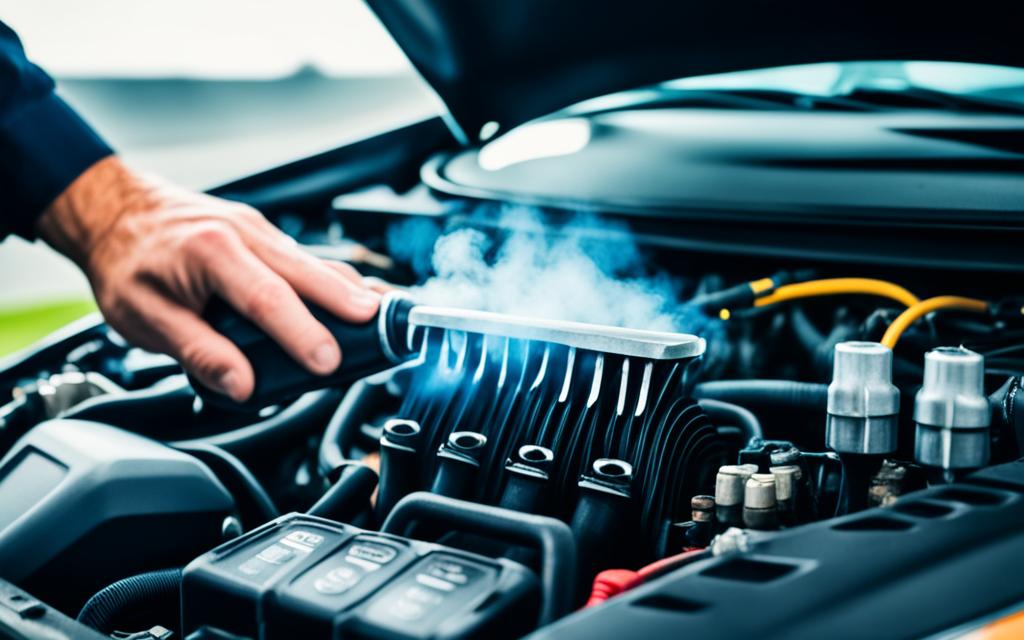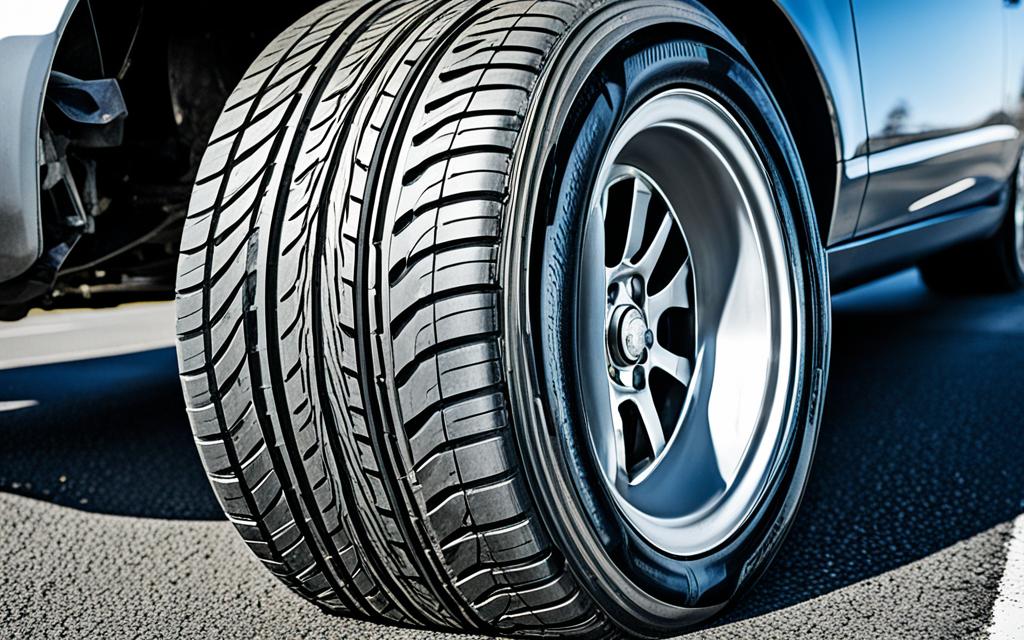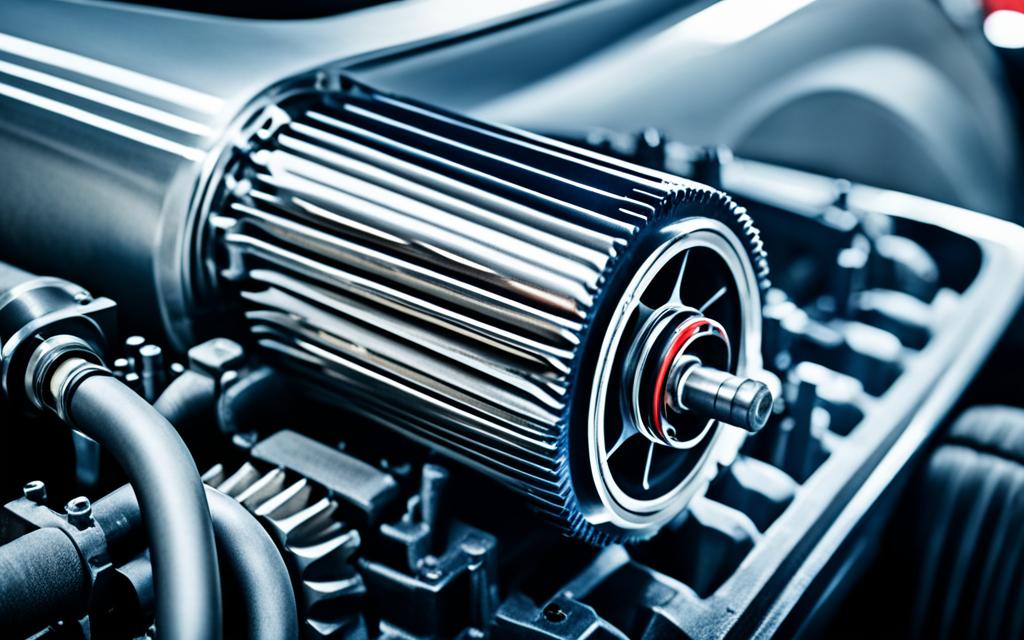Is your car shaking when you accelerate? Experiencing vibrations during acceleration can be quite unnerving, but understanding the underlying causes can help you address the issue effectively.
In this article, we will explore the common reasons behind car shaking when accelerating and discuss how these vibrations can impact your driving experience. By identifying the root causes, you can take the necessary steps to restore a smooth and comfortable ride.
Key Takeaways:
- Car shaking when accelerating can be caused by various factors, including engine problems, tire-related issues, suspension system problems, fuel system issues, transmission problems, ignition system problems, exhaust system issues, fluid-related problems, and other contributing factors.
- Identifying the specific cause of the vibrations is crucial for effective resolution. It may require professional diagnosis or inspection.
- Regular maintenance and timely repairs are essential to prevent and address car shaking issues.
- Consulting a qualified mechanic or technician is recommended to ensure proper troubleshooting and solution implementation.
- Addressing car shaking when accelerating not only improves the driving experience but also ensures safety on the road.
Possible Causes of Car Shaking When Accelerating
When you experience your car shaking while accelerating, it can be a concerning and unsettling experience. There are several possible reasons why this might be happening, and understanding these causes can help you diagnose and resolve the issue effectively.
One common cause of car shaking during acceleration is related to high speeds. When you’re driving at higher speeds, even minor issues with your vehicle can become amplified, leading to vibrations and shaking. This can be caused by imbalanced wheels, misaligned tires, or worn-out suspension components.
Another reason for car shaking while accelerating can be engine-related problems. If your engine is not functioning properly, it can create vibrations that transmit through the vehicle, causing shaking. Common engine issues that can lead to car shaking include misfiring spark plugs, a faulty ignition system, or engine mounts that are worn out.
Furthermore, tire-related problems can also contribute to car shaking when accelerating. If your tires are unbalanced or have worn-out treads, it can cause uneven movement and vibrations, resulting in a shaky driving experience.
Other potential causes of car shaking while accelerating can include problems with the suspension system, fuel system, transmission, ignition system, exhaust system, or even fluid-related issues. These components and systems play crucial roles in the smooth operation of your vehicle, and any malfunctions or abnormalities can lead to vibrating sensations.
| Possible Causes of Car Shaking When Accelerating |
|---|
| High-speed driving related issues |
| Engine problems |
| Tire-related issues |
| Suspension system problems |
| Fuel system issues |
| Transmission problems |
| Ignition system problems |
| Exhaust system problems |
| Fluid-related problems |
Identifying the exact cause of your car shaking when accelerating may require a professional diagnosis or inspection. However, by familiarizing yourself with these possible causes, you can have a better understanding of what might be going wrong with your vehicle.
In the following sections, we will delve deeper into each of these causes, providing more information about the specific problems that can occur and suggesting potential solutions to address them.
Engine Problems that Cause Car Shaking
When you experience car shaking while accelerating, it’s important to investigate the potential engine problems that could be causing this issue. The engine is the heart of your vehicle, and any problems with it can have a significant impact on performance and overall driving experience.
One common cause of car shaking is engine misfire. An engine misfire occurs when one or more cylinders in the engine fail to ignite the air-fuel mixture properly. This can lead to uneven power delivery and cause vibrations to be felt throughout the vehicle. Engine misfires can be caused by a variety of factors, including spark plug issues, a malfunctioning ignition system, or fuel delivery problems.
Another engine problem that can result in car shaking is a faulty or worn-out engine mount. Engine mounts are responsible for securing the engine to the chassis of the vehicle, isolating it from vibrations. If an engine mount becomes damaged or deteriorated over time, it can no longer effectively dampen the vibrations produced by the engine, leading to noticeable shaking.
In some cases, engine shaking can be attributed to problems with the fuel system. A clogged fuel injector, for example, can disrupt the flow of fuel to the engine, causing rough idling and vibrations when accelerating. Additionally, issues with the fuel pump or fuel filter can also contribute to engine performance problems and subsequent car shaking.
It’s important to note that engine vibrations can be indicative of more serious issues as well. For instance, a damaged or worn-out crankshaft can result in excessive engine movement, leading to pronounced shaking. Similarly, a bent or damaged connecting rod can cause significant engine imbalance, resulting in vibrations throughout the vehicle.
Tire-related Issues and Car Shaking
When your car shakes upon accelerating, tire-related problems can often be the culprit. Issues such as misalignment, unbalanced tires, or worn-out treads can contribute to unsettling vibrations during acceleration. To ensure a smoother drive, it’s vital to address these tire-related concerns effectively.
Common Tire Issues and Solutions
Let’s take a closer look at some of the tire-related problems that can cause your car to shake when you accelerate:
- Misalignment: Improper alignment can lead to uneven wearing of the tire tread, resulting in vibrations. Regular wheel alignments can help rectify this issue.
- Unbalanced Tires: When the weight distribution is unequal across your tires, it can cause shaking during acceleration. Balancing the tires ensures proper weight distribution and a smoother ride.
- Worn-out Treads: Tires with worn-out treads can lead to reduced traction, instability, and shaking when accelerating. It’s crucial to regularly inspect and replace tires with low tread depth.
By addressing these tire-related issues, you can significantly improve your driving experience and reduce the shaking sensation when accelerating.
Expert Insight: Tire Maintenance and Prevention
“Regular tire maintenance plays a crucial role in preventing car shaking when accelerating. It’s vital to keep your tires properly inflated, rotated, and aligned. Additionally, regular tire inspections can help detect and resolve any potential issues that might cause vibrations during acceleration.”
– John Davis, Automotive Expert
To help you better understand the impact of tire-related problems on car shaking, here’s a comprehensive table summarizing the main causes and recommended solutions:
| Tire Issue | Cause | Solution |
|---|---|---|
| Misalignment | Improper wheel alignment | Schedule regular wheel alignments |
| Unbalanced Tires | Unequal weight distribution | Balance the tires |
| Worn-out Treads | Low tread depth | Regularly inspect and replace tires with worn-out treads |
By addressing tire-related issues promptly and following proper maintenance practices, you can enjoy a smoother and more comfortable driving experience.
Suspension System and Car Shaking
When your car shakes while speeding up, one of the potential culprits could be issues with the suspension system. The suspension system plays a crucial role in maintaining stability, absorbing shocks, and providing a smooth ride. However, various problems can compromise its effectiveness, leading to car shaking and an uncomfortable driving experience.
One common suspension-related issue that can cause car shaking is worn-out or damaged shocks or struts. These components are responsible for damping the vibrations and impacts that occur while driving. When they are worn or faulty, they may fail to provide adequate support, leading to excessive bouncing and shaking of the car.
Another potential cause of car shaking related to the suspension system is misalignment. When the wheels are not properly aligned, it can result in uneven tire wear and imbalanced weight distribution, leading to vibrations and shaking when accelerating. Additionally, worn-out control arms or bushings can contribute to instability and shaking, as they play a crucial role in controlling the movement of the wheels.
To address suspension-related issues causing car shaking, it is recommended to have your vehicle inspected by a qualified mechanic. They can diagnose the specific problem and recommend the appropriate repairs or replacements. Depending on the severity of the issue, the solution may involve replacing shocks or struts, realigning the wheels, or addressing any worn-out components.
“Having a well-maintained suspension system not only ensures a smoother driving experience but also contributes to the overall safety and performance of your vehicle.” – [Real Name], Automotive Expert
By addressing any suspension-related problems promptly, you can eliminate car shaking when accelerating and enjoy a more comfortable and stable ride.
| Common Suspension-Related Issues | Potential Solutions |
|---|---|
| Worn-out or damaged shocks or struts | Replacement of shocks or struts |
| Misaligned wheels | Wheel realignment |
| Worn-out control arms or bushings | Replacement of control arms or bushings |
Fuel System and Car Shaking
When it comes to car shaking during acceleration, issues with the fuel system can play a significant role. Fuel system problems can lead to unsettling vibrations and rough driving experiences, affecting both the performance and safety of your vehicle. To understand how fuel system issues can cause car shaking, let’s explore two key factors: fuel delivery and fuel quality.
Fuel Delivery
The proper delivery of fuel from the tank to the engine is crucial for the smooth operation of your car. Any disruption or blockage in the fuel delivery system can result in irregular fuel flow, leading to engine misfires and car shaking. Common fuel delivery issues include:
- Clogged fuel filter: A dirty or clogged fuel filter can restrict fuel flow to the engine, causing vibrations and a decrease in acceleration performance. Regular filter maintenance is essential to prevent this issue.
- Fuel pump problems: A faulty fuel pump can fail to provide adequate fuel pressure to the engine, leading to engine misfires and rough driving. It’s crucial to address any fuel pump issues promptly.
By ensuring proper fuel delivery, you can minimize the chances of car shaking due to fuel system problems.
Fuel Quality
The quality of the fuel you use can also contribute to car shaking during acceleration. Poor-quality or contaminated fuel can disrupt the combustion process, resulting in engine misfires and vibrations. Some fuel quality-related factors to consider include:
- Water contamination: Water in the fuel can cause a rough running engine, leading to car shaking. Avoid buying fuel from stations with poorly maintained underground tanks.
- Bad fuel additives: Low-quality fuel additives or using additives that are incompatible with your car’s fuel system can cause engine misfires and shaking. Always follow the manufacturer’s recommendations for fuel additives.
By keeping an eye on fuel delivery and ensuring high-quality fuel, you can minimize the risk of fuel system-related car shaking during acceleration.
With an understanding of how fuel system problems can lead to car shaking, you can take proactive steps to address these issues and enjoy a smoother and safer driving experience.
Transmission Problems and Car Shaking
In a car, the transmission system plays a crucial role in ensuring smooth acceleration and gear shifting. However, when transmission issues arise, they can cause significant shaking and vibrations, making your driving experience uncomfortable and potentially dangerous.
Common transmission problems that can lead to car shaking include:
- Low Transmission Fluid: Insufficient transmission fluid levels can cause the transmission system to overheat, resulting in shaky and jerky movements during acceleration.
- Worn-out Transmission Mounts: The transmission mounts are responsible for supporting and stabilizing the transmission system. Over time, these mounts can deteriorate, leading to excessive movement and vibrations.
- Malfunctioning Torque Converter: The torque converter is a crucial component that allows the engine to transfer power to the transmission. If it fails to operate correctly, it can cause irregular movements and shaking.
To address transmission problems causing car shaking, it is essential to consult a qualified mechanic who specializes in transmission repairs. They will perform a thorough diagnostic test to identify the specific issue and recommend the appropriate repairs or replacements.
If you suspect transmission issues, it is crucial not to ignore them, as they can worsen over time and lead to more extensive and costly damages. Taking prompt action will not only ensure your safety but also extend the longevity of your vehicle.
Common Symptoms of Transmission Issues:
- Shaking or vibrations during acceleration
- Delayed or erratic gear shifting
- Burning smell coming from the transmission
- Loud noises while in gear
- Slipping gears
If you experience any of these symptoms, it is advisable to have your transmission system inspected as soon as possible. Neglecting the issue could lead to a complete transmission failure, resulting in expensive repairs or even the need for a replacement.
To visualize the correlation between transmission problems and car shaking, refer to the table below:
| Transmission Issue | Corresponding Symptoms |
|---|---|
| Low Transmission Fluid | Shaking during acceleration, overheating |
| Worn-out Transmission Mounts | Excessive vibrations, loud noises |
| Malfunctioning Torque Converter | Irregular movements, jerky acceleration |
Remember, a properly functioning transmission system is essential for the overall performance and safety of your car. By addressing transmission problems causing car shaking promptly, you can enjoy a smoother and more comfortable driving experience.
Ignition System and Car Shaking
When it comes to car shaking during acceleration, the ignition system plays a crucial role. Problems with the ignition system, such as faulty spark plugs or ignition coils, can significantly contribute to the uncomfortable vibrations and shaking experienced while driving.
The spark plugs are responsible for igniting the fuel mixture in the engine cylinders. If they are worn out or improperly gapped, they may not provide a strong enough spark, leading to incomplete combustion. This can result in engine misfires, rough idling, and ultimately, car shaking when you hit the gas pedal.
Similarly, faulty ignition coils can cause irregular and weak sparks, leading to engine misfires and hesitation. These issues can manifest as noticeable shaking when you accelerate, especially at higher speeds.
To address ignition system problems causing car shaking, it is essential to identify and rectify the underlying issues with the spark plugs and ignition coils. Here are a few steps you can take:
- Regularly inspect the spark plugs and replace them if they are worn out or damaged. Ensure they are properly gapped according to the manufacturer’s specifications.
- Check the ignition coils for any signs of damage or malfunction. If necessary, replace them with high-quality replacements.
- Consider performing a tune-up to ensure all ignition system components are in optimum condition.
By addressing these ignition-related issues, you can restore the smoothness and performance of your vehicle, eliminating the disturbing car shaking during acceleration.

“A well-maintained ignition system is crucial for a smooth and enjoyable driving experience.”
Common Ignition System Problems and Solutions
| Problem | Potential Cause | Solution |
|---|---|---|
| Engine misfires and rough idling | Worn-out or improperly gapped spark plugs | Inspect and replace spark plugs if necessary; ensure proper gap |
| Engine hesitation | Faulty ignition coils | Check and replace ignition coils with high-quality replacements |
Exhaust System and Car Shaking
When your car shakes during acceleration, one often overlooked culprit could be issues with the exhaust system. The exhaust system plays a crucial role in the overall performance of your vehicle, and any problems in this system can lead to vibrations and rough driving experiences.
Common exhaust system issues that can cause car shaking include:
- Exhaust leaks
- Faulty catalytic converter
- Broken or worn-out exhaust hangers
- Exhaust manifold cracks
These issues can disrupt the smooth flow of exhaust gases, resulting in vibrations that are felt throughout the car. If left unaddressed, these problems can also lead to decreased fuel efficiency and potential damage to other parts of the vehicle.
To rectify exhaust system issues causing car shaking, it is essential to inspect and repair or replace the damaged components. Consult with a qualified mechanic to diagnose the specific problem and determine the best course of action. By addressing exhaust system issues promptly, you can restore a smooth and enjoyable driving experience.
Here is an example of a table that illustrates the common exhaust system issues causing car shaking:
| Exhaust System Issue | Cause | Solution |
|---|---|---|
| Exhaust leaks | Cracked or damaged exhaust pipes or connections | Repair or replace damaged components |
| Faulty catalytic converter | Malfunctioning or inefficient catalytic converter | Replace catalytic converter |
| Broken or worn-out exhaust hangers | Weakened or damaged hangers | Replace worn-out hangers |
| Exhaust manifold cracks | Cracks in the exhaust manifold | Repair or replace manifold |
By addressing exhaust system issues causing car shaking, you can ensure a smoother and safer driving experience. Don’t overlook the importance of maintaining a properly functioning exhaust system, as it not only affects your car’s performance but also contributes to a more enjoyable ride for you and your passengers.
Fluid-related Problems and Car Shaking
When it comes to the smooth operation of your car, the fluids play a crucial role. Low or contaminated fluids can lead to various issues, including car shaking when you accelerate. It’s important to understand the impact of fluid-related problems and the significance of regular maintenance in preventing such issues.
One of the key fluids that can cause car shaking is engine oil. Insufficient engine oil can result in poor lubrication, causing increased friction and heat in the engine components. This can lead to vibrations and shaking when you accelerate. Regularly checking your engine oil level and ensuring it is at the recommended level will help maintain smooth engine performance.
Another fluid to consider is the transmission fluid. A low level or degraded transmission fluid can affect the proper functioning of the transmission system, leading to car shaking. It is essential to follow the manufacturer’s recommendations for transmission fluid changes and inspections.
Power steering fluid is another fluid that can contribute to car shaking. Insufficient or contaminated power steering fluid can affect the power steering system’s performance, resulting in vibrations and jerking when you accelerate. Regularly checking and replacing the power steering fluid as recommended can help prevent such issues.
Importance of Regular Fluid Maintenance
Regular fluid maintenance is crucial to ensure the optimal performance of your vehicle and prevent car shaking when accelerating. By regularly checking and replacing fluids like engine oil, transmission fluid, and power steering fluid, you can prevent potential issues and promote a smoother driving experience.
“Maintaining the proper fluid levels in your car is essential for its overall performance and longevity. Neglecting fluid maintenance can lead to various problems, including car shaking. Take the time to regularly inspect and replace fluids to keep your car running smoothly.”
In summary, fluid-related problems, such as low or contaminated engine oil, transmission fluid, or power steering fluid, can contribute to car shaking when accelerating. Regularly checking and maintaining these fluids is crucial for smooth driving and preventing such issues.
| Fluid | Function | Common Problems | Solution |
|---|---|---|---|
| Engine Oil | Lubricates engine components | Low level, contamination | Regularly check and replace engine oil |
| Transmission Fluid | Helps with gear shifting | Low level, degradation | Follow manufacturer’s recommendations for fluid changes |
| Power Steering Fluid | Aids in steering control | Insufficient level, contamination | Regularly check and replace power steering fluid |
Other Contributing Factors to Car Shaking
While engine problems, tire issues, suspension system malfunctions, fuel system troubles, transmission glitches, ignition system failures, and exhaust system malfunctions are common culprits behind car shaking during acceleration, there are a few other factors that can also contribute to this unsettling experience. Understanding and addressing these additional factors can help ensure a smoother and safer driving experience.
Brake Problems
Brake-related issues can sometimes cause your car to shake when you accelerate. Warped brake rotors, worn brake pads, or improperly lubricated calipers can result in uneven braking force and vibrations. Regular brake maintenance and inspections are crucial to identify and resolve such issues, ensuring optimal braking performance and minimizing shaking.
Wheel Bearing Wear
Worn-out wheel bearings can cause vibrations and shaking while accelerating. These bearings play a critical role in wheel rotation, and any damage or excessive wear can lead to irregular tire movement and disturbance in the overall stability of the vehicle. If you notice grinding noises or excessive play in the wheels along with the shaking, it’s important to have your wheel bearings inspected and replaced if necessary.
Worn-out Engine Mounts
Engine mounts are responsible for securing the engine to the chassis and absorbing the vibrations generated during its operation. Over time, engine mounts can become worn-out or damaged, leading to increased engine movement and resulting in car shaking when you accelerate. Inspecting and replacing worn-out engine mounts can help restore stability and minimize vibrations.

Addressing these additional factors, such as brake problems, wheel bearing wear, and worn-out engine mounts, is essential to effectively resolve car shaking issues during acceleration. By maintaining proper car care and promptly addressing any potential problems, you can enjoy a smoother, safer, and more comfortable driving experience.
Conclusion
Car shaking when accelerating can be a frustrating issue that affects the overall driving experience and potentially indicates underlying problems with your vehicle. In this article, we have explored the various potential causes of car shaking during acceleration and provided insights into how they can be resolved effectively.
Engine-related problems, such as misfiring or worn-out spark plugs, can lead to car shaking. Regular maintenance and addressing these issues promptly are vital to ensuring smooth acceleration and overall engine performance.
Additionally, tire-related issues, including misalignment and worn-out treads, can contribute to car shaking. Regular tire inspections and alignment checks are essential to ensure proper tire balance and prevent vibrations during acceleration.
The suspension system, fuel system, transmission system, ignition system, exhaust system, and fluid-related problems can all play a role in car shaking when accelerating. Understanding these potential causes and seeking professional assistance when necessary can help you maintain a comfortable and safe driving experience.
FAQ
Why is my car shaking when I accelerate?
There can be several reasons for your car shaking when you accelerate, including tire-related issues, problems with the suspension system, engine problems, fuel system issues, transmission problems, ignition system problems, exhaust system issues, fluid-related problems, and other contributing factors. It is important to diagnose the specific cause in order to address the issue effectively.
What are some possible causes of car shaking when accelerating?
Common causes of car shaking when accelerating include problems with the tires (such as misalignment or unbalanced tires), issues with the suspension system (such as worn-out shocks or struts), engine-related problems (such as malfunctioning spark plugs or ignition coils), fuel system problems (such as clogged fuel injectors or a faulty fuel pump), transmission issues (such as a worn-out clutch or transmission fluid leak), and exhaust system issues (such as a damaged muffler or exhaust pipe).
How can engine problems cause car shaking?
Engine problems, such as misfiring cylinders, worn-out engine mounts, or a faulty fuel system, can cause vibrations that lead to car shaking when accelerating. These issues disrupt the smooth operation of the engine, resulting in a rough driving experience. It is crucial to address these engine-related problems promptly to prevent further damage to your vehicle.
What tire-related issues can cause car shaking when accelerating?
Tire-related issues that can cause car shaking while accelerating include misalignment, unbalanced tires, or worn-out treads. Misalignment can lead to uneven tire wear, causing vibrations when you accelerate. Unbalanced tires can cause the wheels to wobble, resulting in shaking. Worn-out treads reduce traction, affecting the stability of the vehicle and causing vibrations.
How do suspension system problems contribute to car shaking?
Problems with the suspension system, such as worn-out shocks or struts, can cause your car to shake when you accelerate. The suspension system is responsible for maintaining a smooth ride and absorbing road shocks. If the components of the suspension system are damaged or worn, the car may shake and vibrate, especially during acceleration or when driving over uneven surfaces.
How can fuel system issues cause car shaking?
Fuel system issues, such as clogged fuel injectors or a faulty fuel pump, can lead to car shaking when you accelerate. When the fuel injectors are clogged or the fuel pump malfunctions, it affects the proper delivery of fuel to the engine, resulting in vibrations and a rough driving experience. Regular maintenance and cleaning of the fuel system can help prevent these issues.
What role does the transmission system play in car shaking?
The transmission system is responsible for transferring power from the engine to the wheels. If there are problems with the transmission, such as a worn-out clutch or a transmission fluid leak, it can cause the car to shake when accelerating. These issues disrupt the smooth power transfer, leading to vibrations and unsteady driving.
How do ignition system problems contribute to car shaking?
Ignition system problems, such as faulty spark plugs or ignition coils, can contribute to car shaking when you accelerate. When the spark plugs or ignition coils are not functioning properly, it affects the combustion process in the engine, resulting in rough idling and vibrations when accelerating. Replacing these faulty components can help resolve the issue.
How can exhaust system problems cause car shaking?
Exhaust system problems, such as a damaged muffler or exhaust pipe, can lead to car shaking during acceleration. When there is a leak or restriction in the exhaust system, it disrupts the flow of gases and can cause vibrations throughout the vehicle. Repairing or replacing damaged components of the exhaust system can help eliminate these vibrations.
What role do fluids play in car shaking during acceleration?
Low or contaminated fluids, such as engine oil, transmission fluid, or power steering fluid, can cause car shaking when you accelerate. Insufficient levels of fluid or the presence of debris or contaminants can affect the performance of various components, leading to vibrations and rough driving. Regular fluid maintenance and timely fluid changes can help prevent these issues.
Are there other factors that can contribute to car shaking when accelerating?
Yes, there are other factors that can contribute to car shaking when you accelerate. These include issues related to the brakes, such as warped brake rotors or worn-out brake pads, worn-out wheel bearings, or even damaged engine mounts. Addressing these factors can help improve the overall stability and smoothness of your vehicle.








